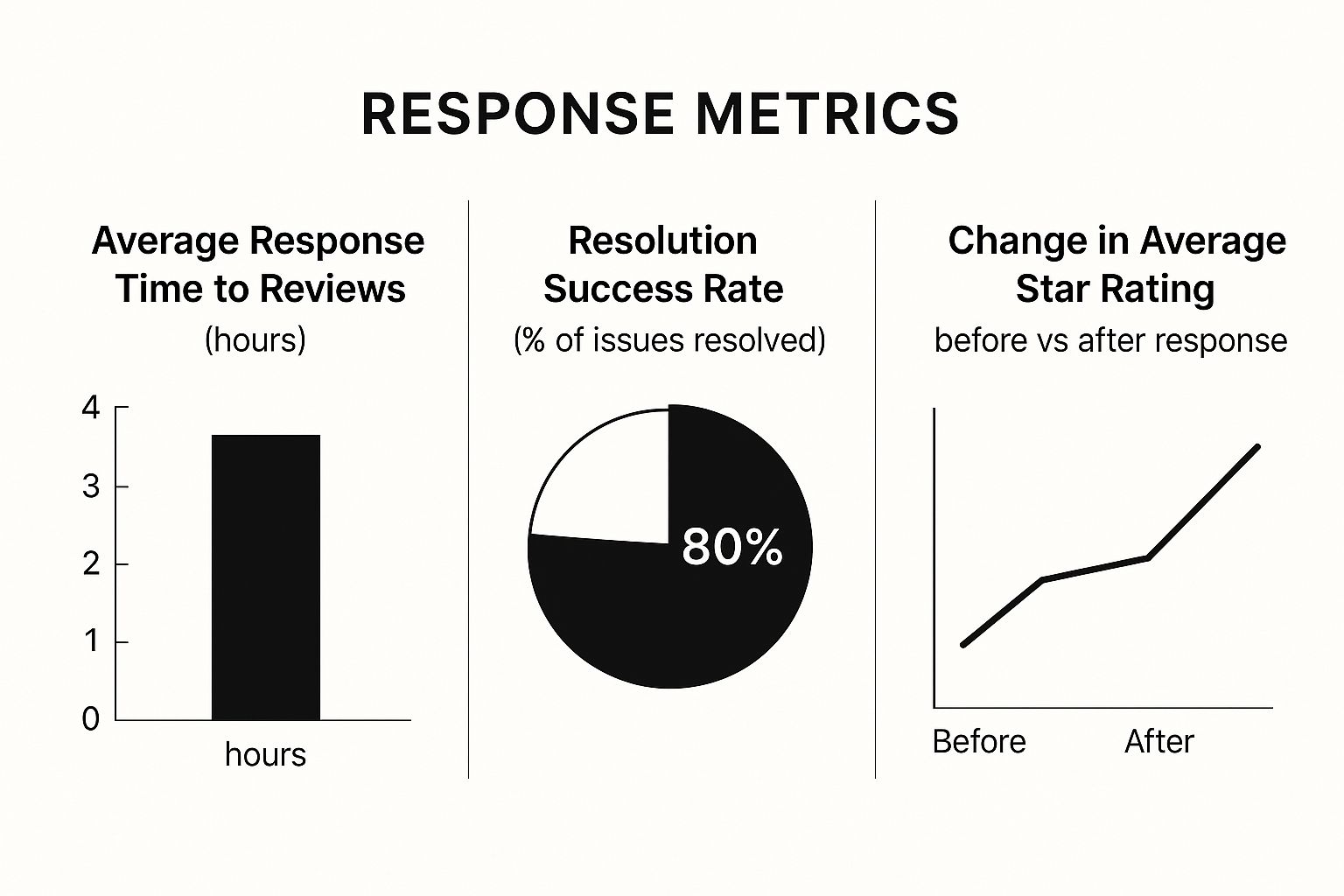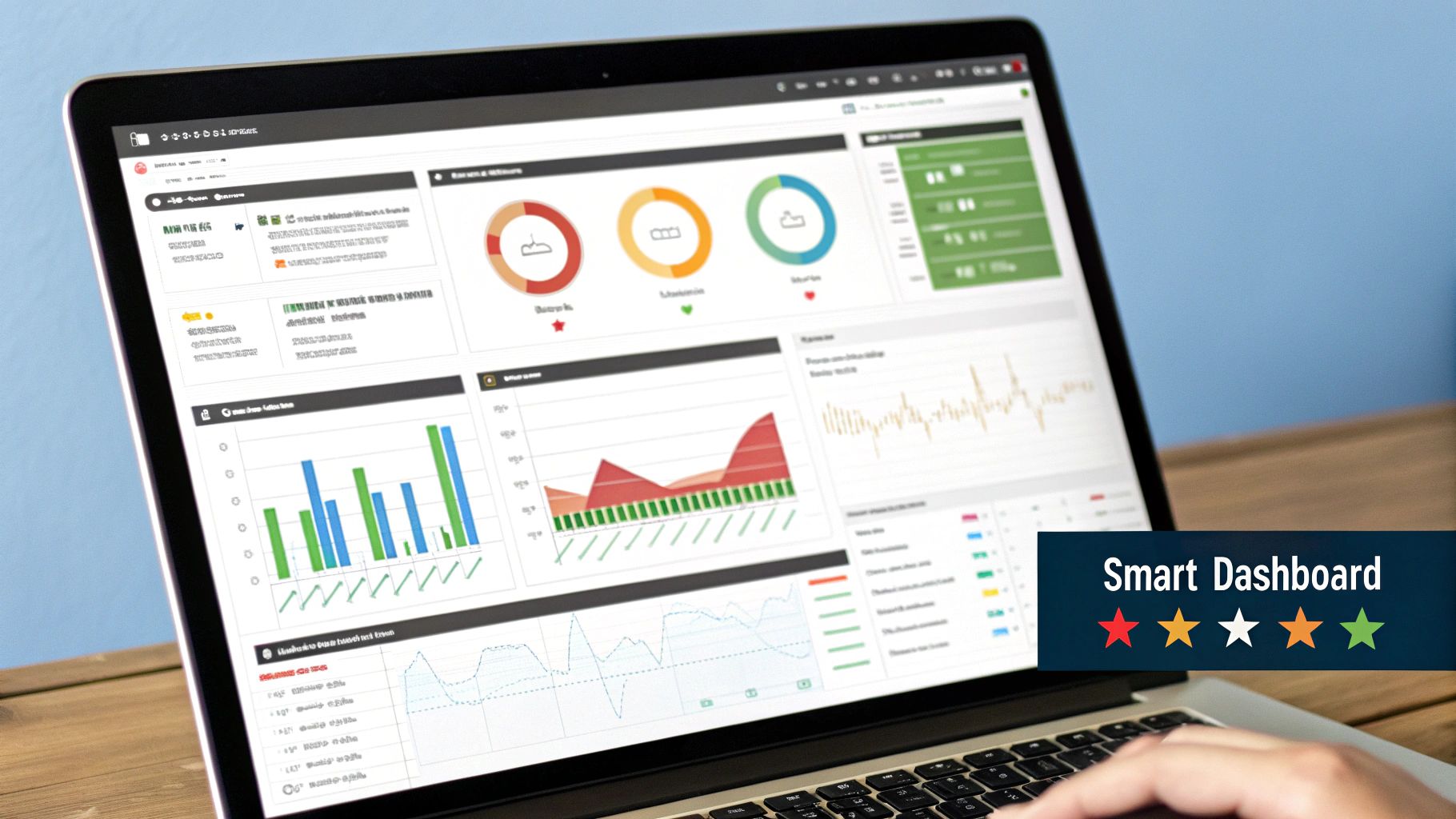Reputation Management for Apartments | Boost Your Property’s Image
When it comes to filling vacancies, your apartment community’s online reputation isn’t just a part of the marketing plan—it is the plan. Think of it as the strategic process of keeping your finger on the pulse of what people are saying about you online, and then actively shaping that conversation.
It’s all about building trust with potential renters long before they ever step foot on the property. By engaging with feedback on critical sites like Google, Yelp, and Apartments.com, you’re showing everyone that you care. A solid online reputation almost always translates to higher occupancy and better-quality tenants.
Why Your Online Reputation Is Your Most Valuable Asset

The days of relying on a “For Rent” sign and a classified ad are over. Today, a renter’s search for a new home kicks off online, where your property’s digital footprint creates the first, and most lasting, impression. Prospects aren’t just glancing at floor plans and amenities; they’re digging deep into reviews to get the real story on what it’s like to be a resident.
This online deep-dive is a massive part of their decision. Recent industry research reveals that a staggering 91% of renters use online reviews when searching for a new apartment. What’s more, over half of them are more likely to rent from a property that actively responds to those reviews. This proves that your engagement matters just as much as your star rating. You can explore a complete multifamily marketing overview to see just how important this has become.
The New Digital Curb Appeal
Your online listings and reviews are, for all intents and purposes, your new digital curb appeal. Before a prospect even thinks about scheduling a tour, they’re searching for answers to their biggest questions:
- Is the management team responsive? They’re looking for reviews that mention quick maintenance turnarounds and helpful office staff.
- Is the property safe and clean? Comments about well-maintained common areas or good lighting provide the social proof they need.
- What about noisy neighbors? Seeing how you publicly and professionally handle a noise complaint can put a cautious renter at ease.
A well-executed reputation management strategy puts you in control of this narrative. Instead of just reacting to feedback, you’re actively shaping a story that builds confidence and trust. This is particularly vital on Google, where your average star rating and response rate can directly affect how well you show up in local searches.
The data below paints a clear picture of how online reputation directly impacts leasing decisions.
How Reputation Metrics Influence Renter Decisions
| Renter Behavior | Percentage of Renters | Implication for Property Managers |
|---|---|---|
| Trusts Online Reviews | 88% | Reviews are the new word-of-mouth; they are a primary source of trust. |
| Avoids Properties with Low Ratings | 72% | A poor star rating is a direct barrier, filtering you out of consideration early. |
| Reads Management Responses | 94% | How you respond is as important as the review itself; prospects are watching. |
| Values Recent Reviews More | 85% | An ongoing stream of fresh, positive feedback is essential for relevance. |
As the numbers show, ignoring your online presence is no longer an option. Every review, positive or negative, is a chance to demonstrate your commitment to resident satisfaction.
The heart of reputation management for apartments isn’t just about chasing five-star ratings. It’s about publicly demonstrating your commitment to a great resident experience, turning every review into a powerful marketing tool.
Ultimately, this proactive approach has a direct and positive impact on your bottom line. A property with a stellar online reputation naturally attracts more qualified leads, fills vacancies faster, and can often justify higher rental rates. It’s not a business expense; it’s an investment in your single most valuable asset.
How to Proactively Generate Authentic Reviews
If you’re just sitting back and hoping positive reviews will magically appear, you’re leaving your property’s reputation to chance. The best reputation management for apartments involves building a system to encourage authentic feedback. The whole idea is to make it incredibly easy for happy residents to share their experiences right when they feel most positive about your community.
Timing is everything. Sending out a generic, mass email blast asking for reviews rarely works. Instead, you need to pinpoint those key moments in a resident’s journey where you’ve just delivered great service. These “moments of delight” are the perfect time to pop the question.
Think about these high-impact opportunities:
- Right After a Maintenance Fix: The moment a work order is marked “complete,” send a quick text or email. A speedy fix for a leaky faucet or a broken AC unit makes a resident feel heard and valued—an ideal catalyst for a great review.
- A Few Days After Move-In: Once a new resident has had a chance to settle in, check on them. A simple, “How is everything in your new home?” opens the door for a gentle nudge toward leaving a review about their smooth experience.
- When They Renew Their Lease: This is the ultimate vote of confidence. A resident choosing to stay for another year is clearly happy. It’s a natural time to ask them to share exactly what they love about living there.
Crafting the Perfect Ask
Your request needs to feel like it came from a person, not a robot. Ditch the corporate jargon and aim for a warm, direct, and simple message. The main goal here is to remove every possible obstacle between the resident and the review platform.
A simple text message, for example, can be incredibly effective:
“Hi [Resident Name]! We saw our maintenance team just fixed your AC. We hope everything is cool and comfortable now! If you have a moment, would you mind sharing your experience on Google? It helps others find a great place to live. [Direct Link to Google Review Page]”
See how that works? It’s timely, personal, and includes a direct link, making it a one-click process for the resident. The review they leave becomes an instant, powerful testimonial. If you want to give residents a little inspiration on what to write, this guide on how to write testimonials has some great tips.
A Quick Word of Caution on Incentives
I know it’s tempting to offer a $25 gift card or a small rent credit for a review, but this is a minefield you want to avoid. The Federal Trade Commission (FTC) has some very strict rules about this, and review platforms like Yelp and Google flat-out forbid incentivizing reviews.
Key Takeaway: Offering a reward for a review, even if you’re not explicitly asking for a positive one, can get you penalized. More importantly, it destroys the trust you’re trying to build. A prospect who finds out your five-star reviews were paid for will be gone in a heartbeat.
Instead of trying to buy reviews, focus your energy on creating an amazing resident experience. That well-run community event, the sparkling clean pool, or just a friendly wave from the leasing staff—those are the things that inspire genuine, powerful reviews that will attract your next great resident.
Mastering the Art of Responding to Every Review
Think of every single review—good, bad, or indifferent—as a live-action marketing opportunity. This isn’t just about damage control. Your replies are on public display, and dozens of prospective renters are watching to see how you handle both praise and problems.
A generic, copy-pasted “Thanks for your review!” is a complete waste of that opportunity. When a resident takes the time to leave a glowing five-star comment, your response needs to amplify their positivity and subtly market your best features.
For instance, if someone writes, “Love living here! The maintenance team is so fast,” you can turn that into a powerful testimonial.
“We’re thrilled to hear that, [Resident Name]! Our maintenance team really prides itself on resolving requests quickly, so it means a lot that you’ve noticed. Thanks for being such a valued member of our community!”
See what that does? It personalizes the interaction, reinforces a key selling point (fast maintenance), and fosters that all-important sense of community. This is the heart of effective reputation management for apartments.
Turning Negative Feedback into a Positive Impression
Now for the tough part. Handling negative reviews is where great property management truly shines. A scathing review about a noise complaint or a broken amenity can feel like a PR crisis, but I’ve learned to see it as a chance to show off our professionalism and empathy.
The trick is to have a simple, consistent game plan for every negative review. It’s not complicated:
- Acknowledge and Empathize: Always start by validating their frustration. A simple “We’re so sorry to hear you’ve had this experience” goes a surprisingly long way.
- Take Ownership: You don’t have to agree with every detail or admit fault, but you do need to show you take the issue seriously.
- Move it Offline: The goal is always to resolve the real problem privately, not debate it publicly. Offer a direct line of contact—a specific person’s name, email, or phone number—to get the conversation out of the comments section.
The infographic below really drives home how a structured response strategy can move the needle on key metrics like response time, how often you actually solve the problem, and even your overall star rating.
As the data shows, properties that get back to people quickly and effectively see a real, measurable boost in their online reputation. And in this market, that directly impacts how many leases you sign.
Real-World Scenarios and Response Tactics
Let’s walk through a classic complaint I’ve seen a hundred times: a resident is furious about a pest issue. An amateur manager might get defensive or drop a generic line. A pro knows how to de-escalate and direct.
The Complaint: “I’ve seen roaches in my unit twice now. I called the office and nothing happened. This is unacceptable for what I pay in rent.”
A Strong Response:
“Thank you for bringing this to our attention. We are very sorry to hear about this frustrating situation and take it extremely seriously. Please contact our community manager, Jessica, directly at [phone number] or [email] so we can schedule an immediate pest control visit and get this resolved for you.”
This works because it’s empathetic, gives the resident a clear action to take, and immediately moves the conversation offline. It shows every prospect reading your reviews that when a problem pops up, your team is on it.
This level of engagement is non-negotiable, especially when you learn that 81% of renters say reviews are a major factor in their search. You can discover more insights about renter preferences to see just how much these details matter.
Choosing the Right Reputation Management Tools
Let’s be honest: trying to manually keep up with reviews on Google, Apartments.com, Facebook, and a dozen other sites is a fast track to burnout. You’re guaranteed to miss things. A single scathing comment can derail a potential lease, while an glowing review you never saw is a completely wasted marketing opportunity. This is exactly why dedicated reputation management for apartments isn’t a “nice-to-have”—it’s an absolute must.
Think of a good platform as your central command center, not just another monthly expense. The right software brings all your reviews into one place, shoots you an alert the second a new one pops up, and helps your team fire off consistent, professional responses in record time. It’s the only practical way to manage multiple properties without letting crucial feedback fall through the cracks.
Must-Have Features for Apartment Portfolios
When you start looking at software, it’s easy to get sidetracked by flashy features that don’t actually solve your problems. For the multifamily industry, you need to cut through the noise and focus on what truly moves the needle.
Here’s what I always tell property managers to look for:
- A Unified Review Dashboard: This is the big one. Seeing every review from every site on a single screen is a game-changer. No more logging in and out of ten different platforms.
- Sentiment Analysis: Modern tools can scan the text of reviews to pick up on trends. Are people raving about the new dog park? Or are you starting to see a pattern of complaints about the package room? This is how you find operational issues before they become major problems.
- Smart Response Templates: AI can now draft personalized, on-brand responses that your team can quickly edit and post. It’s a huge time-saver and ensures every resident feels heard.
- Automated Alerts: You need instant notifications when a new review goes live. Quick replies matter—65% of consumers are more likely to do business with companies that respond to reviews.
When shopping for a platform, it’s critical to match the features to the real-world challenges your team faces every day. I’ve put together a table to help you compare the essential features and understand why they are so important in an apartment setting.
Essential Features in an Apartment Reputation Management Platform
| Feature | Why It’s Important for Apartments | What to Look For |
|---|---|---|
| Unified Review Dashboard | Consolidates reviews from all major listing sites (Google, Apartments.com, Yelp, etc.) into one view. Saves immense time for on-site staff. | Look for platforms that integrate with the specific review sites where your properties are most active. Ensure the interface is intuitive and easy to navigate. |
| Sentiment Analysis | Automatically categorizes feedback (positive, negative, neutral) and identifies recurring themes like “maintenance,” “amenities,” or “noise.” | AI-powered topic and keyword tracking. Dashboards that visualize trends over time so you can spot operational issues or highlight successes. |
| AI-Assisted Response Generation | Drastically cuts response time by suggesting personalized, brand-compliant replies that your team can quickly approve or edit. | Customizable templates, the ability to learn your brand voice, and options that suggest different tones (e.g., empathetic, professional). |
| Automated Review Solicitation | Systematically sends review requests to residents via email or SMS at key moments (e.g., after a maintenance ticket is closed, post-move-in). | Integration with your Property Management System (PMS) is key for automating requests based on resident activity. Customizable messaging is also a must. |
| Competitor Benchmarking | Tracks your properties’ online reputation scores against local competitors, giving you a clear picture of where you stand in the market. | The ability to add specific competitor properties and compare star ratings, review volume, and sentiment across the same set of review sites. |
Choosing a platform with these core functionalities ensures you’re not just managing reviews, but actively using resident feedback to improve operations and strengthen your market position.
Scaling Your Strategy with the Right Tech
The bigger your portfolio, the more you need the right technology. For anyone managing over 100 units, a powerful platform is non-negotiable if you want to keep occupancy high. Why? Because a stellar online reputation is directly tied to your bottom line and is a huge piece of any successful SEO management plan.
The data doesn’t lie. An analysis of over 11,300 multifamily properties showed that properties with higher Reputation Scores consistently beat industry averages in both occupancy and revenue.
Pro Tip: Make sure any tool you consider integrates with your existing property management software, like Yardi or RealPage. This connection is what makes reputation management a seamless part of your team’s daily workflow instead of another tedious task.
This integration is what turns a good strategy into a great one, allowing you to turn resident feedback into real, actionable insights. For more on the link between reputation and financial performance, you can read the full property management report.
Turning Resident Feedback into Operational Excellence
Your online reviews are so much more than a marketing score. They’re a free, constant stream of business intelligence that tells you exactly what it’s like to live at your property. The sharpest property managers I know treat this feedback as a direct line into the resident experience.
This isn’t just about managing what people see online; it’s about using what you learn to run a better, more successful community. You have to connect the dots between an angry comment on Google and a real-world operational issue. The goal is to shift from just reacting to reviews to proactively improving your property based on what residents are telling you. This is where excellent reputation management for apartments creates real, lasting value.
From Data Points to Action Plans
First thing’s first: you have to start looking at your review sites as a data source. Forget the star ratings for a minute and dig into the actual comments to find the recurring themes. Are the same topics—good or bad—popping up over and over again?
You can use sentiment analysis tools to speed this up, but honestly, a manual review by your team often reveals the most potent insights.
- Maintenance Problems: One complaint about a slow work order is just a one-off. But if you see five similar comments in a month? That’s not an anecdote; it’s a sign of a bottleneck in your process or maybe even a staffing shortage.
- Amenity Conditions: Are people constantly mentioning the outdated gym equipment or a dirty pool area? That’s not just a gripe—it’s a bright, flashing signal telling you where to allocate funds in your next budget.
- Staff Interactions: Is a specific leasing agent getting all the positive shout-outs for their amazing service? That’s your cue to reward that team member and use their approach as a training model for everyone else.
When you start tracking these trends, you can stop guessing and start fixing the root causes of resident unhappiness. This lets you put your time and money into the fixes that matter most.
Creating a Culture of Constant Improvement
Getting these insights is a great start, but it’s only half the job. The real magic happens when you get this information into the hands of your on-site teams. Your maintenance technicians and leasing agents are on the front lines every single day, and they need to see the direct connection between their work and the property’s online reputation.
An online review is simply the public outcome of a private experience. If you focus on making the experience better, the reviews will naturally follow.
I remember working with a property that was getting hammered with negative reviews about move-in cleanliness. Instead of just replying online, the regional manager began sharing screenshots of these reviews in the weekly team meetings. They used that direct, unfiltered feedback to build a much more detailed “move-in ready” checklist for both the cleaning and maintenance crews.
The result? Within three months, the negative comments completely disappeared. Even better, they started getting positive reviews that specifically mentioned how spotless the apartments were on move-in day. That’s what happens when you close the feedback loop. It gives your team ownership, makes residents happier, and ultimately turns your property into a place people genuinely want to call home.
Your Top Apartment Reputation Management Questions, Answered
Even the best reputation management plan runs into tricky situations. Let’s walk through some of the most common questions I hear from property managers and tackle them head-on, so you can handle these challenges like a seasoned pro.
What Do I Do About a Fake Review?
It’s infuriating. A one-star review pops up from someone you’ve never even had on a tour, let alone as a resident. Your gut reaction might be to jump in and defend your property, but trust me, that’s the last thing you want to do. Getting into a public argument just makes you look unprofessional to actual prospects.
Instead, breathe and follow a process. The first step is to flag the review directly on the platform where it was posted, whether it’s Google, Yelp, or another site. When you report it, calmly explain why you believe it’s fake—the most common reason being you have no record of a resident or prospect by that name. It’s not a guaranteed fix, but review sites will often take down posts that clearly violate their terms of service.
While you wait for the platform to investigate, you still need to post a public reply.
“Thank you for sharing your feedback. We take all resident concerns very seriously, but we can’t seem to find anyone with your name in our resident or prospect records. Our community manager would be glad to speak with you directly to clear this up. Please contact us at [phone number or email].”
This kind of response is perfect. It shows potential renters that you’re responsive and professional, while subtly letting them know the review might not be legitimate.
Should I Just Delete Negative Comments on Social Media?
I get this question a lot, and the answer is almost always a hard no. Wiping negative comments from your Facebook or Instagram page might seem like a quick fix, but it can blow up in your face. It makes it look like you’re hiding something, and it can provoke the original commenter to escalate the situation, turning a single complaint into a much bigger problem.
There are, of course, a few exceptions. You absolutely should remove a comment if it includes:
- Profanity, hate speech, or personal attacks on your team or other residents.
- Spammy links or anything that looks like a phishing attempt.
- Someone’s private information, like a phone number or apartment number.
For any legitimate complaint, even if it’s harsh, the best approach is to respond publicly with empathy. Acknowledge their frustration, and then immediately offer to take the conversation offline to find a solution. Transparency builds far more trust than a squeaky-clean comment section that everyone knows is unrealistic.
How Can I Actually Measure the ROI of All This?
Measuring the return on your reputation management efforts isn’t as simple as looking at one number, but it’s completely doable. The goal is to connect the dots between your online presence and your leasing performance.
Start by tracking a few key performance indicators (KPIs) and watch how they change as your reputation improves:
- Lead-to-Tour Conversions: As your average star rating climbs and you get more reviews, you should see more people who visit your website actually booking a tour.
- Walk-in Traffic Sources: Make it a habit to ask prospects, “How did you hear about us?” When you start hearing “I saw your great reviews on Google” more often, that’s a direct win.
- Lease Closing Ratio: A great online reputation builds trust before a prospect even steps through the door. This often makes the leasing team’s job easier, boosting their closing rate.
- Review Velocity: Keep an eye on the number of new reviews you’re getting each month. A steady flow of recent, positive feedback is one of your most valuable leasing tools.
Think about it this way: when you can show that lifting your average star rating from 3.8 to 4.5 led to a tangible increase in qualified tours and signed leases, you’ve built a powerful business case for your strategy.
At the end of the day, solid reputation management for apartments does more than just make you look good online. It directly reduces vacancy loss, gives you the leverage to support rental rate increases, and helps you attract better, more qualified residents. Those financial impacts are the ultimate measure of success.
At Reviews To The Top, we provide the tools and expertise to turn your online reputation into your most powerful leasing asset. We help you automate review generation, respond faster with AI-powered assistance, and gain the operational insights needed to drive occupancy. Discover how we can help your portfolio at reviewstothetop.com.



